Physical Address
304 North Cardinal St.
Dorchester Center, MA 02124
Physical Address
304 North Cardinal St.
Dorchester Center, MA 02124

Discover Morocco’s Hidden Treasures – A Complete Guide to Unforgettable Tourism Adventures and Best Destinations in 2025
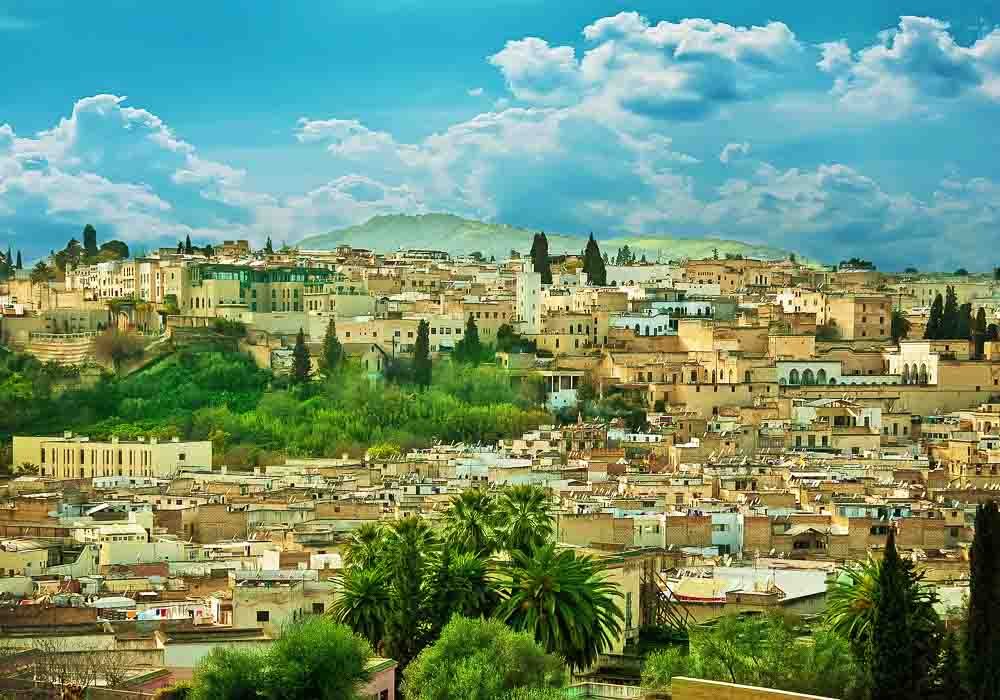
Meta Description: Explore Morocco’s hidden gems and best tourism destinations in 2025. Find budget-friendly travel tips, cheap flights, affordable hotels, cultural experiences,Family vacation ideas, Unfamiliar places Morocco, Traditional Moroccan festivals and secret local favorites for an unforgettable Moroccan adventure.
Have you ever dreamed of walking through ancient medinas where every corner whispers tales of sultans and traders? Where the scent of exotic spices mingles with the call to prayer, and where golden dunes meet azure coastlines? Welcome to Morocco, a land where dreams become reality and every traveler discovers their own hidden paradise.
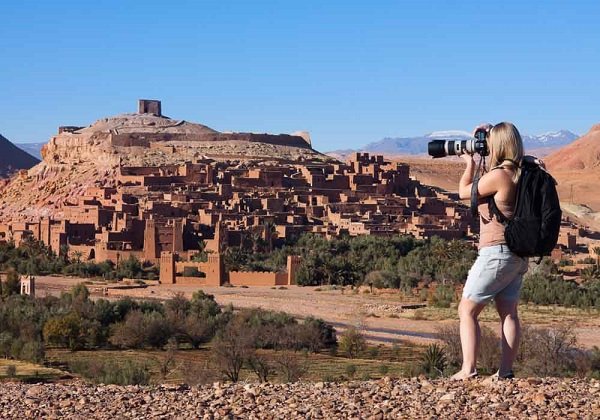
Old cities in Morocco
I still remember my first glimpse of the Atlas Mountains from the plane window, their snow-capped peaks rising majestically from ochre plains. That moment, I knew Morocco would capture my heart forever. Today, I’m sharing everything I’ve learned about exploring this magical kingdom without breaking the bank, because extraordinary adventures shouldn’t be reserved for the wealthy alone.
Morocco isn’t just a destination,it’s a sensory symphony that awakens every part of your being. Picture this: you’re sipping mint tea in a rooftop café, watching the sun paint Marrakech’s walls in shades of rose gold, while the distant Atlas Mountains stand guard like ancient sentinels. The warmth of Moroccan hospitality wraps around you like a favorite blanket, making you feel instantly at home in this foreign land.You can visit the official Moroccan tourism website here.
What makes Morocco truly special isn’t just its stunning landscapes or historic architecture,it’s the way this country seamlessly blends the ancient with the modern. You’ll find yourself haggling for handwoven carpets in thousand-year-old souks, then enjoying world-class cuisine in contemporary restaurants just steps away. Morocco offers cultural experiences that connect you with traditions dating back centuries.
The diversity here is staggering. From the rolling dunes of the Sahara to the dramatic coastlines of Essaouira, from the snow-dusted peaks of the High Atlas to the verdant valleys of the Rif Mountains, Morocco packs an entire continent’s worth of experiences into one relatively compact country. For those seeking nature and wildlife experiences, Morocco delivers in ways that will leave you speechless.
Morocco offers incredible value for money, especially when you know where to look. A country where you can enjoy a delicious tagine for under $5, sleep in a beautiful riad for $30, and take a train across stunning landscapes for less than $20. The recent infrastructure improvements, including the high-speed rail connection between Casablanca and Tangier, have made traveling around Morocco easier and more comfortable than ever before.
The exchange rate works in favor of international visitors, making Morocco an ideal destination for budget-conscious travelers seeking luxury experiences. Whether you’re planning a romantic getaway for couples looking for honeymoon destinations or organizing family trip planning adventures, Morocco accommodates every type of traveler.
For your convenience, you can easily book your journey through Travel Go Easy, ensuring seamless flight bookings and comfortable transfers from the airport to your hotel through our reliable transfer service.
Let me take you beyond the typical tourist trails to discover Morocco’s best-kept secrets. These hidden gems represent the soul of Morocco, places where authenticity thrives and travelers find their most treasured memories.
Everyone knows about Chefchaouen’s famous blue walls, but have you discovered the hiking trails that lead to the sacred Jebel al-Kalaa peak? I stumbled upon this gem during my third visit, following a narrow path that wound through olive groves and ancient stone terraces. The panoramic view from the top reveals the entire blue city spread below like a sapphire scattered across the mountainside.
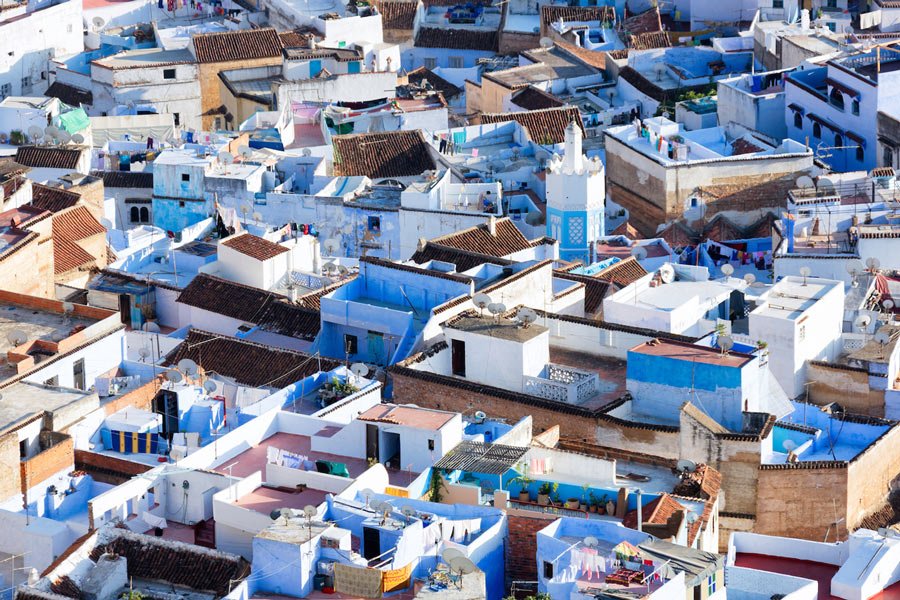
Chefchaouen: The Blue Pearl’s Secret Corners
Early morning is magical here , before the tour groups arrive. Watch the sun slowly illuminate each blue-washed wall while shopkeepers prepare their colorful displays of handwoven textiles and aromatic herbs. The silence is profound, broken only by the distant bleating of goats and the gentle murmur of morning prayers.
For budget travelers, guesthouses in the medina start at just $15 per night, often including breakfast and mint tea throughout the day. The family-run establishments offer insights into local life that no guidebook could provide.
While most visitors rush through this UNESCO World Heritage site for quick photos, those who stay longer discover its living history. Climb to the very top of the kasbah during sunset , yes, it’s a steep scramble over crumbling walls but the reward is spectacular. The entire Ounila Valley stretches before you, painted in impossible shades of gold and crimson.
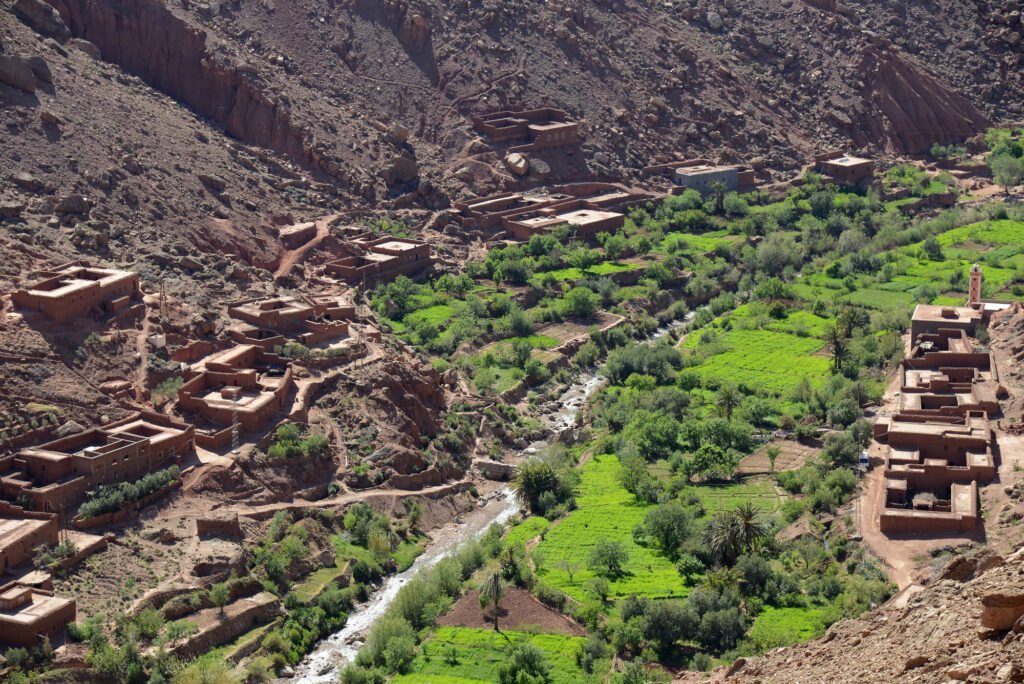
Ounila Valley
Stay in nearby Ouarzazate and take early morning walks through the village before it awakens. You’ll encounter elderly Berber women preparing traditional bread in communal ovens, children playing ancient games in dusty courtyards, and artisans creating the same pottery techniques their ancestors used centuries ago.
These are the (undiscovered treasures) that transform casual tourists into passionate Morocco advocates.
Forget expensive Agadir resorts Essaouira offers authentic coastal Morocco at fraction of the cost. This windswept port city enchants with its Portuguese-influenced architecture, vibrant fishing harbor, and endless beaches perfect for both relaxation and adventure.
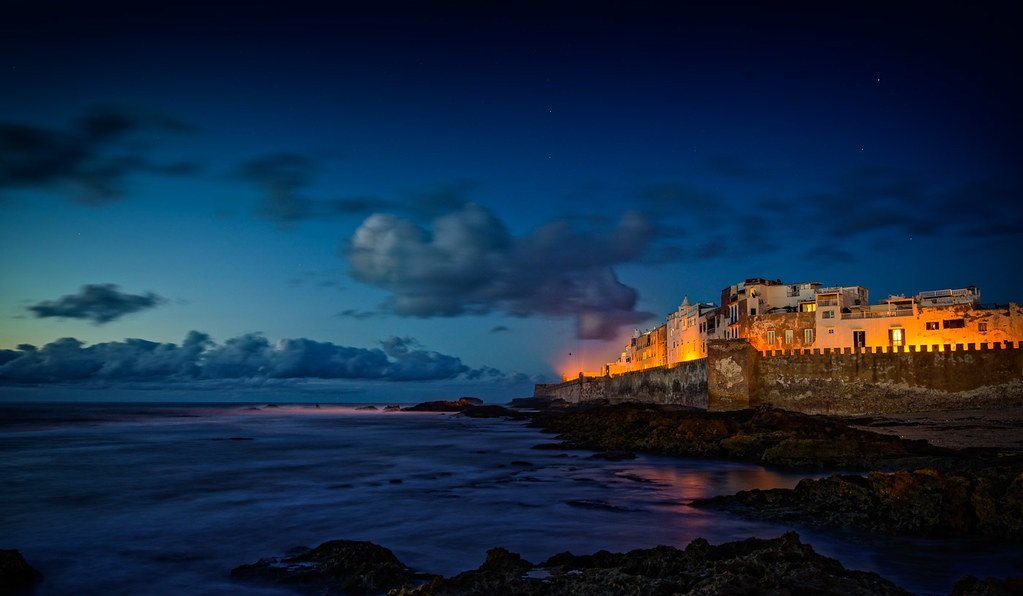
What most guidebooks won’t tell you is that Essaouira’s strongest winds create perfect conditions for windsurfing and kitesurfing, with equipment rental costing just $25 per day. The local surf schools offer lessons for beginners at incredibly reasonable rates.
Wander through the medina’s art galleries where local painters capture the Atlantic light in stunning canvases. The fish market near the port serves the freshest seafood I’ve ever tasted grilled sardines, calamari, and sea bream prepared right before your eyes for under $8.
Hidden in the foothills of the Atlas Mountains, about an hour from Agadir, lies one of Morocco’s most spectacular natural wonders. Paradise Valley features a series of crystal-clear natural pools connected by small waterfalls, surrounded by palm trees and dramatic rock formations.
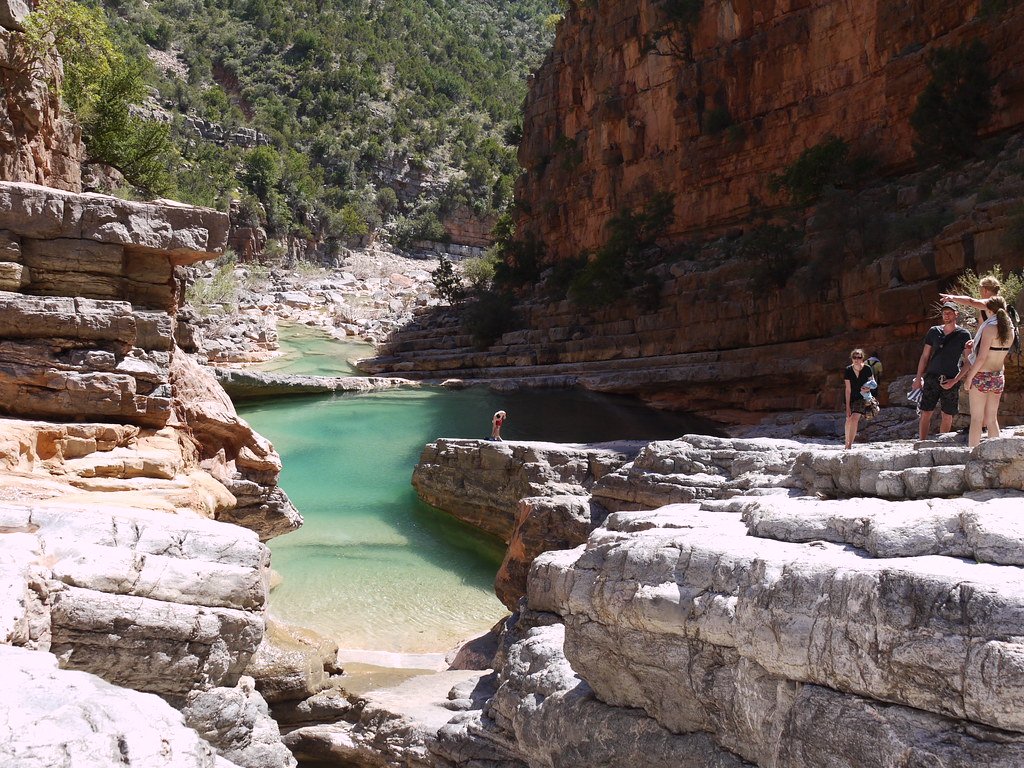
Paradise Valley: Nature’s Hidden Swimming Pool
The journey here becomes part of the adventure winding mountain roads reveal breathtaking vistas at every turn. Pack a picnic lunch and spend the entire day swimming in the refreshing pools, jumping from rocks, and exploring hidden caves behind the waterfalls.
Entry is free, making this an ideal destination for budget travelers seeking (unfamiliar places) that offer five-star experiences without the price tag.
The secret to affordable Morocco travel lies in understanding local pricing structures and timing your visit strategically. After numerous trips and countless conversations with local guides, I’ve discovered money-saving strategies that can reduce your travel costs by up to 60% without sacrificing experience quality.
Morocco’s shoulder seasons (March-April and October-November) offer the perfect balance of pleasant weather and reduced prices. During these periods, accommodation costs drop significantly while temperatures remain comfortable for exploration.
Summer brings intense heat but also the lowest prices of the year. If you can handle temperatures reaching 40°C (104°F), you’ll find incredible deals on everything from riads to restaurant meals. Many locals retreat indoors during afternoon hours, creating opportunities for budget travelers to explore attractions with minimal crowds.
Winter offers mild temperatures perfect for desert excursions and city exploration, though mountain regions can be surprisingly cold. This season provides excellent value for visitors seeking planning travel trips during European winter months.
Ultra-Budget Option ($10-20 per night): Hostels in major cities offer dormitory beds with shared facilities. Guesthouses in smaller towns provide private rooms with basic amenities. Many include breakfast and unlimited mint tea, adding significant value to your stay.
Mid-Range Comfort ($20-50 per night): Traditional riads in medinas offer authentic Moroccan architecture with modern amenities. These family-run establishments often include breakfast, airport transfers, and invaluable local advice. Book directly through their websites or by calling to avoid commission fees.
Budget Luxury ($50-100 per night): Boutique riads with pools, terraces, and designer décor become affordable during off-season periods. Many offer cooking classes, guided tours, and spa services included in room rates.
For convenient hotel bookings with guaranteed best rates and instant confirmation, our platform ensures you find perfect accommodation matching your budget and preferences.
Morocco’s transportation network offers numerous budget-friendly options for savvy travelers. The key is understanding which option works best for different routes and situations.
Train Travel: Morocco’s railway system connects major cities efficiently and affordably. Second-class tickets cost approximately $8-15 between major destinations, while first-class upgrades add just $3-5 for significantly improved comfort. The new high-speed Al Boraq train between Casablanca and Tangier showcases modern Morocco at its finest.
Book tickets at stations rather than online to avoid processing fees. Bring snacks and water, as onboard services can be expensive.
Bus Networks: CTM and Supratours operate comfortable, air-conditioned buses connecting cities and smaller towns. Prices typically range from $5-12 for intercity routes. These buses often prove more reliable than private companies and include amenities like Wi-Fi and charging ports.
Local Transportation: Within cities, petit taxis offer convenient short-distance travel for $1-3 per ride. Always insist on using the meter or agree on prices before departing. Grand taxis (shared taxis) connect cities and rural areas economically, typically costing $3-8 per person for intercity routes.
For hassle-free airport transfers and city-to-city transportation, consider booking through our reliable transfer service, ensuring comfortable journeys with fixed prices and professional drivers.
Moroccan cuisine represents one of the world’s great culinary traditions, offering complex flavors developed over centuries of cultural exchange. The best part? Incredible food doesn’t require expensive restaurants,some of my most memorable meals cost less than $5.
Navigate the aromatic chaos of local food markets, where every stall tells its own delicious story. In Marrakech’s Jemaa el-Fna square, follow the locals to identify the best vendors,they know where to find the freshest ingredients and most authentic preparations.

Street Food: Where Flavor Meets Value
Must-Try Street Foods:
The key to safe street food consumption lies in observation,choose stalls with high turnover, where food is prepared fresh and served hot. Trust your nose; aromatic, appetizing smells indicate quality ingredients and proper preparation.
Venture beyond tourist-oriented establishments to discover (locally favored places) where residents dine regularly. These family-run restaurants typically offer larger portions, lower prices, and more authentic flavors than their medina counterparts.
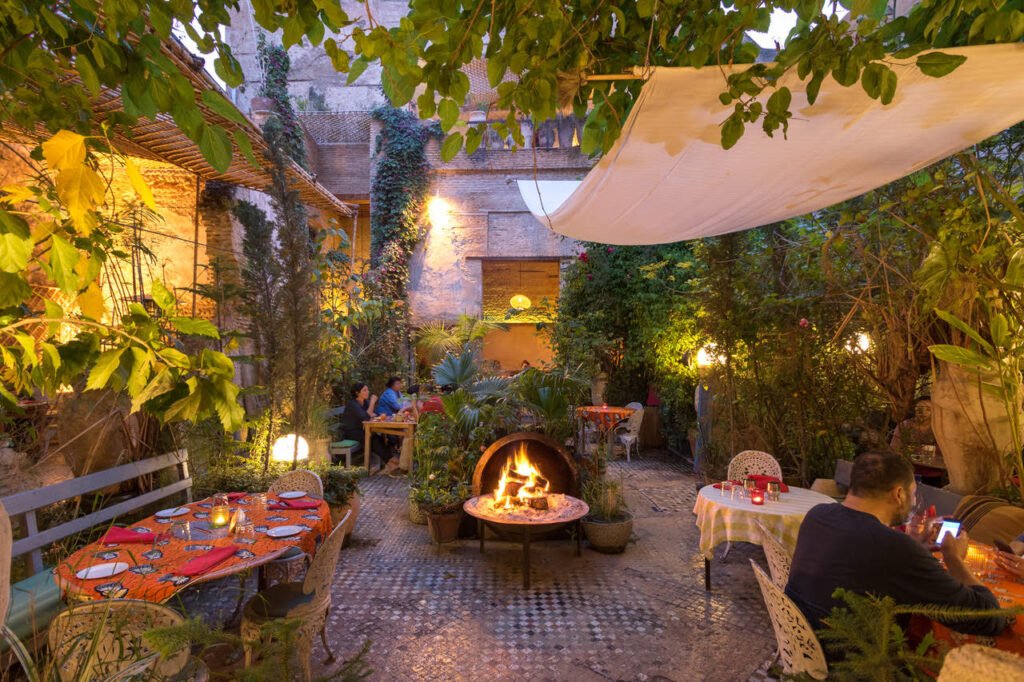
Moroccan – family restaurants
Look for restaurants without multilingual menus,these usually cater to locals rather than tourists. Don’t be intimidated by language barriers; pointing at neighboring tables and smiling universally communicates your interest in trying local favorites.
Budget Dining Strategies:
Nothing connects you with local culture like learning to prepare traditional dishes alongside Moroccan families. Many riads offer cooking classes for $20-40 per person, including market visits, hands-on preparation, and abundant meals.
These experiences provide insights into ingredient selection, spice combinations, and cooking techniques passed down through generations. You’ll return home with recipes, techniques, and stories that keep your Moroccan adventure alive long after departure.
True Morocco experiences happen when you step beyond tourist attractions to engage with local communities and traditions. These cultural encounters create lasting memories while supporting local economies directly.
Morocco’s festival calendar offers numerous opportunities to witness authentic cultural expressions. The Fes Festival of World Sacred Music (June) transforms the ancient medina into a global stage for spiritual music traditions. The Rose Festival in Kelaat M’Gouna (May) celebrates the harvest of Damascus roses with traditional dance, music, and incredible photographic opportunities.
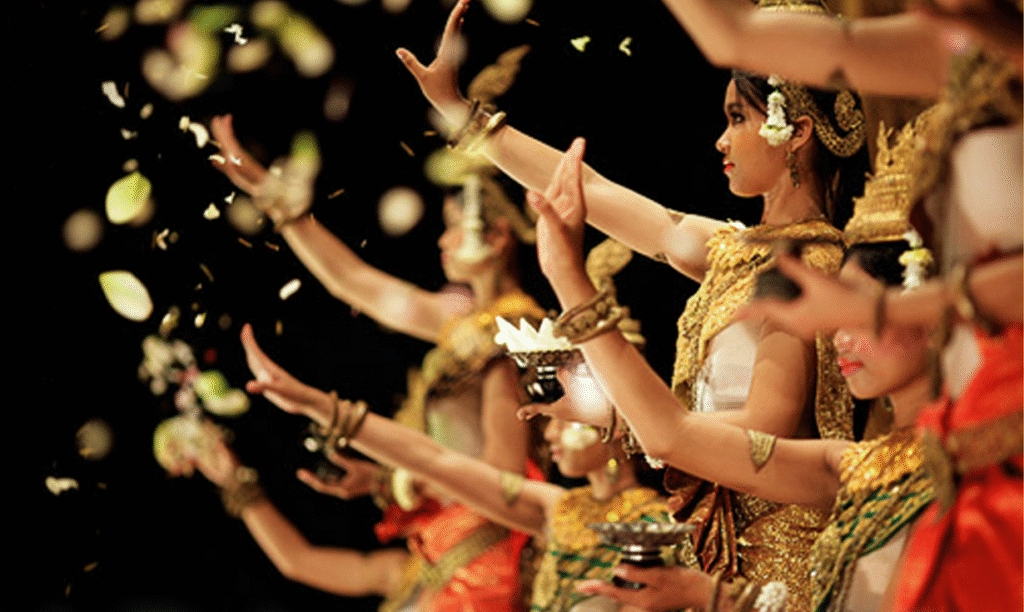
The Rose Festival
Almond Blossom Festival in Tafraoute (February-March) showcases Berber culture amid stunning Anti-Atlas landscapes painted pink and white with flowering trees. These festivals provide intimate glimpses into Morocco’s diverse cultural heritage while supporting local artisans and performers.
Planning your visit to coincide with local celebrations requires advance research and flexible scheduling, but the cultural rewards make extra effort worthwhile. Small village festivals often prove more authentic and accessible than major city events.
Morocco’s traditional crafts represent centuries of artistic evolution, with techniques passed from master to apprentice across generations. Participating in artisan workshops provides hands-on learning experiences while supporting traditional industries.
Pottery workshops in Safi teach clay preparation, wheel throwing, and traditional glazing techniques. Carpet weaving demonstrations in rural cooperatives reveal the intricate processes behind Morocco’s famous textiles. Metalworking classes in Fes show how artisans create elaborate geometric patterns in brass and copper.
These workshops typically cost $15-30 per person and include materials, instruction, and finished pieces to take home. More importantly, they provide opportunities to interact with artisans, understand their daily lives, and appreciate the skill required for traditional crafts.
The Atlas Mountains hide dozens of traditional Berber villages where ancient lifestyles persist largely unchanged. Overnight stays in village guesthouses offer authentic cultural immersion while providing crucial income for remote communities.
Wake to the sound of roosters and witness daily routines that have continued for centuries women baking bread in communal ovens, men tending terraced gardens, children walking mountain paths to school. These experiences reshape perspectives on modern life while highlighting the resourcefulness and resilience of mountain communities.
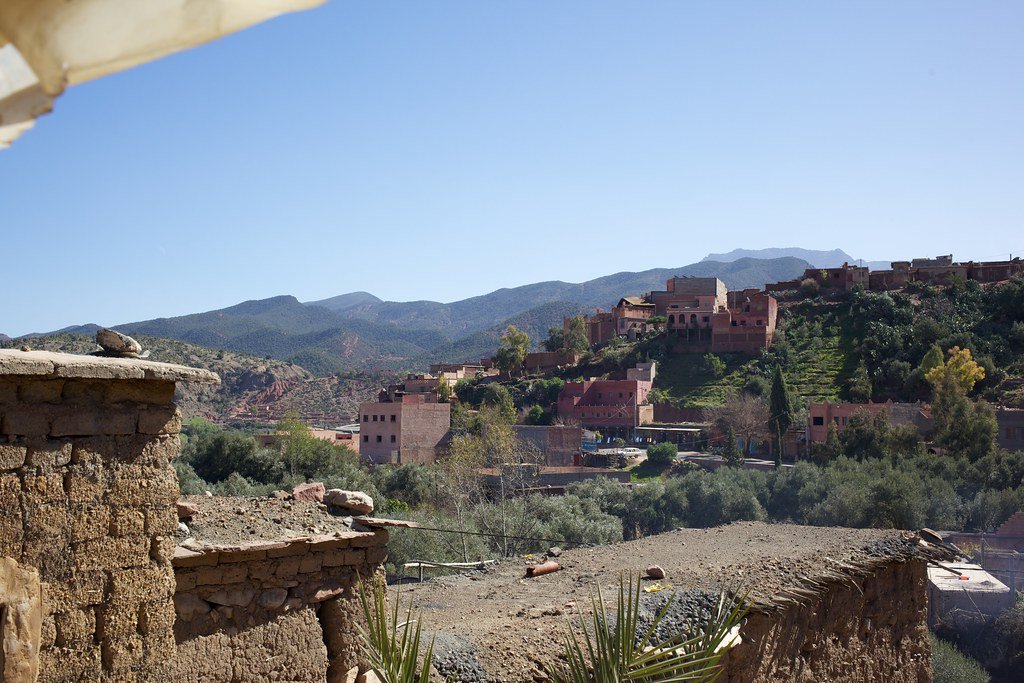
Berber Village – Morocco
Many villages organize guided hikes to nearby waterfalls, traditional markets, or archaeological sites. These excursions typically cost $10-20 per person and include lunch prepared by village families using local ingredients.
For comprehensive cultural journey planning, explore our cultural experiences section for curated authentic encounters throughout Morocco.
Morocco welcomes families with children of all ages, offering diverse experiences that entertain kids while educating them about different cultures and landscapes. The key to successful family travel lies in balancing structured activities with flexible exploration time.
Morocco’s Atlantic and Mediterranean coastlines provide different family beach experiences. Essaouira’s wide, sandy beaches offer calm waters perfect for young swimmers, plus fascinating rock pools to explore during low tide. The constant Atlantic breeze keeps temperatures comfortable even during summer months.
Agadir features resort-style beaches with organized activities, beach clubs, and water sports equipment rental. While more expensive than other coastal areas, Agadir provides amenities that simplify family logistics—nearby restaurants, clean facilities, and English-speaking staff.
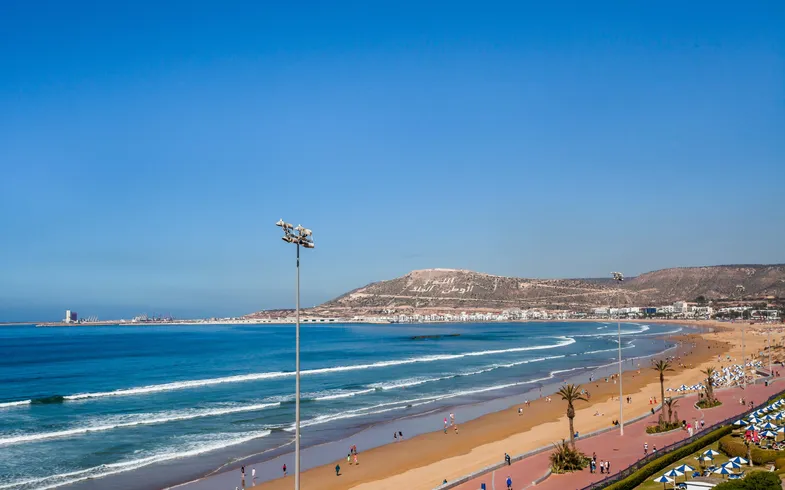
Agadir- Morocco
For unique family adventures, consider dragon tree forests near Essaouira, where ancient trees create natural playgrounds while providing stunning photographic opportunities. These unusual landscapes spark children’s imaginations while offering educational opportunities about environmental adaptation.
Sahara Desert experiences represent Morocco highlights for many families, but require careful planning to ensure comfort and safety for children. Merzouga offers family-friendly desert camps with proper toilets, comfortable bedding, and organized activities designed for various age groups.
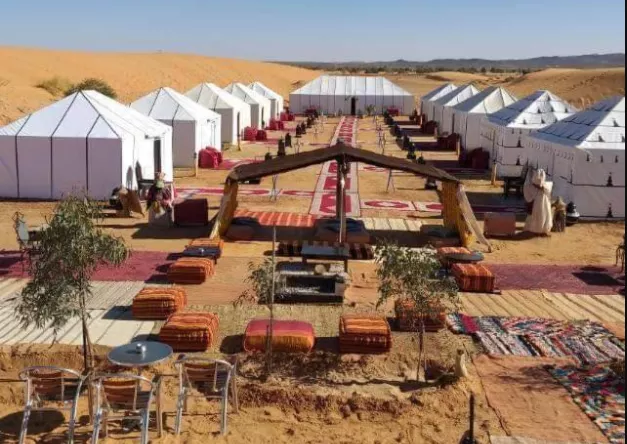
Merzouga family-friendly desert camps
Camel trekking can be challenging for very young children , consider shorter rides during cooler times of day. Many camps offer alternative transportation via 4WD vehicles for families preferring comfort over adventure. Evening programs typically include traditional music, storytelling, and stargazing that captivate children and adults equally.
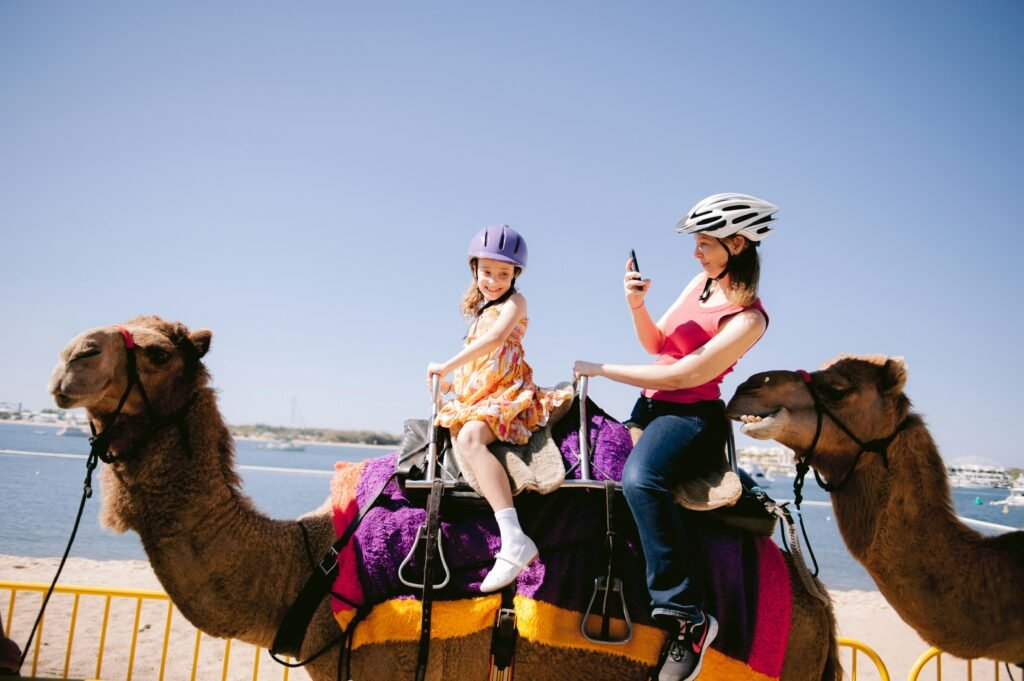
Camel Riding Trips for Kids
Budget-conscious families can opt for day trips to desert edges rather than overnight camping. These experiences provide desert landscapes and cultural encounters while allowing returns to familiar accommodation each evening.
Morocco’s imperial cities offer living history lessons that engage curious minds. Fes medina becomes an outdoor museum where children observe traditional crafts, taste exotic foods, and navigate maze-like streets that have existed for over a thousand years.The official website of the Moroccan city of Fez is here.
Create scavenger hunts to maintain children’s interest during medina exploration searching for specific architectural details, counting different colored doors, or identifying various spices in the souks. These activities transform potentially overwhelming experiences into engaging games.
Meknes provides family-friendly alternatives to busier imperial cities, with spacious squares, accessible monuments, and less intense commercial pressure. The nearby Roman ruins of Volubilis offer tangible connections to ancient history that captivate children while providing educational value.
For specialized family itineraries and child-friendly accommodation recommendations, visit our family trip planning section for expert guidance.
Understanding Morocco’s transportation options enables independent exploration while maximizing budget efficiency. Each transportation method serves different purposes and offers unique advantages for various travel situations.
Royal Air Maroc operates domestic routes connecting major cities efficiently. While more expensive than ground transportation, flights save significant time for travelers with limited schedules. Marrakech to Casablanca flights cost approximately $60-80 and take 45 minutes versus 3 hours by train.
Book domestic flights well in advance for better prices, and consider flying into Casablanca’s Mohammed V International Airport for the widest selection of international connections. The airport’s new Terminal 2 offers modern facilities and efficient immigration processing.
For seamless travel experiences from international arrival to final destination, our flight booking service provides competitive rates and reliable connections throughout Morocco.
Renting cars opens rural Morocco and remote attractions inaccessible by public transportation. International rental companies operate from major airports and cities, while local companies often offer better rates for longer rentals.
Essential driving considerations:
Mountain roads require careful driving, especially during winter months when snow and ice create hazardous conditions. The scenic Tizi n’Tichka pass connecting Marrakech to Ouarzazate offers spectacular views but demands respect for steep grades and tight curves.
Grand taxis represent uniquely Moroccan transportation, offering insights into local travel culture while providing economical intercity connections. These shared vehicles (typically Mercedes sedans or minivans) follow fixed routes between cities and towns.
How grand taxis work:
While less comfortable than private transportation, grand taxis provide cultural immersion opportunities and significant cost savings. Conversations with fellow passengers often lead to local recommendations and unexpected friendships.
Smart spending in Morocco requires understanding local pricing structures, seasonal variations, and cultural expectations. These proven strategies help travelers experience Morocco’s best while maintaining reasonable budgets.
The Moroccan Dirham (MAD) cannot be obtained outside Morocco, so plan to exchange money upon arrival. Airports offer convenience but poor exchange rates exchange only enough for immediate needs then visit banks or authorized exchange bureaus in cities for better rates.
ATMs provide the most favorable exchange rates and widespread availability throughout Morocco. Notify your bank about travel plans to avoid card blocking, and carry backup cards from different providers. Some ATMs charge fees for international cards,look for machines operated by major banks like Attijariwafa Bank or BMCE Bank.
Cash remains king in Morocco,many restaurants, shops, and transportation providers don’t accept cards. Always carry small denomination bills for tips, market purchases, and taxi fares. Haggling is expected in souks but less common in established shops with fixed pricing.
Direct booking often provides better rates than third-party platforms, especially for riads and smaller properties. Many Moroccan accommodations offer discounts for longer stays, cash payments, or advance bookings during off-season periods.
Package deals combining accommodation with meals, activities, or transportation frequently offer substantial savings. Many riads include breakfast, airport transfers, and local tours in their rates,calculate total value when comparing options.
Location flexibility can dramatically impact costs. Staying slightly outside medina centers or choosing newer parts of cities often provides modern amenities at significantly reduced rates. Public transportation makes central areas easily accessible from budget neighborhoods.
For guaranteed best rates and exclusive deals on carefully selected properties, book through our hotel reservation platform featuring hand-picked accommodations throughout Morocco.
Lunch menus typically cost 30-50% less than dinner at the same restaurants. Many establishments offer “menu du jour” featuring soup, main course, dessert, and beverages for fixed prices well below à la carte ordering.
Market eating provides the most economical dining option, fresh bread, local cheese, seasonal fruits, and nuts create satisfying meals for under $5 per person. Most accommodation providers allow guests to eat purchased food in common areas or terraces.
Water bottles cost $0.50-1 when purchased from small shops rather than tourist areas or restaurants. Buying larger containers and refilling smaller bottles reduces both costs and plastic waste.
Morocco’s diverse geography creates varied climate zones requiring different packing and planning strategies. Understanding seasonal patterns helps optimize both weather conditions and travel costs throughout your journey.
Spring represents Morocco’s peak travel season for good reason, mild temperatures, minimal rainfall, and spectacular wildflower displays create ideal conditions for most activities. This period is particularly perfect for planning tourist routes that combine multiple regions.
Advantages:
Considerations:
Summer brings intense heat to inland areas but offers significant cost savings for budget-conscious travelers willing to adjust their schedules. Coastal areas remain comfortable due to Atlantic and Mediterranean breezes.
Survival strategies:
Many riads offer rooftop terraces and pools that become essential during summer months. These amenities, combined with reduced rates, often provide luxury experiences at budget prices.
Many experienced Morocco travelers consider autumn the ideal visiting time,summer heat dissipates while winter rains haven’t arrived. This shoulder season combines pleasant weather with moderate pricing.
September still feels quite warm in desert areas but becomes comfortable in mountains and coastal regions. October provides nearly perfect conditions throughout Morocco. November introduces cooler temperatures ideal for desert exploration and vigorous hiking.
Autumn offers perfect conditions for combining different regions in single trips,desert adventures, mountain trekking, and coastal relaxation all become comfortable during this season.
Winter transforms Morocco’s climate dramatically. While European visitors escape cold weather, Morocco experiences its own winter season with regional variations requiring different preparation strategies.
Desert regions become incredibly pleasant during winter days (60-70°F/15-21°C) but temperatures plummet at night (30-40°F/-1-4°C). This season provides ideal conditions for Sahara experiences without extreme heat or crowds.
Mountain areas receive snow and freezing temperatures, making some passes impassable but creating opportunities for unique winter landscapes. Coastal cities experience mild, occasionally rainy weather perfect for museum visits and cultural exploration.
Morocco maintains excellent safety records for international tourists while requiring awareness of cultural sensitivities and practical precautions. Understanding local customs enhances experiences while showing respect for Moroccan traditions.
Morocco’s major tourist areas are generally very safe, with heavy police presence and community involvement in protecting visitors. However, standard travel precautions remain advisable for all international destinations.
Common sense guidelines:
Scam awareness: Some common tourist-targeted schemes include fake guides offering “official” services, overcharging for simple services, and elaborate stories designed to separate tourists from money. Polite but firm refusal usually resolves these situations.
Emergency contacts: Morocco’s tourist police (Brigade Touristique) operates in major cities and speaks multiple languages. Tourist assistance services provide 24-hour support for visitors experiencing difficulties.
Morocco is a Muslim-majority country where Islamic traditions influence daily life, social interactions, and cultural expectations. Demonstrating respect for these traditions enhances travel experiences while avoiding cultural misunderstandings.
Dress code considerations:
Photography etiquette:
Social interactions:
Morocco poses minimal health risks for most travelers, but standard precautions ensure comfortable trips without medical complications.
Water and food safety:
Medical facilities:
Common health issues:
Morocco’s tourist-friendly visa policies make travel planning straightforward for most international visitors. Recent updates have simplified entry requirements while maintaining security standards.
Visa-free countries (up to 90 days):
Passport requirements:
Entry process:
Required documents:
Recommended documentation:
Digital backup strategy:
Currency information:
Banking and ATM access:
Tipping culture:
Morocco is generally very safe for solo travelers, including women. Major tourist areas have strong police presence and local communities actively protect visitors. Standard precautions like staying aware of surroundings and trusting instincts apply as with any international destination.
Late autumn (October-November) and early spring (March-April) offer the best balance of pleasant weather and moderate pricing. Summer provides the lowest prices but requires heat tolerance, while winter offers excellent desert conditions at reasonable rates.
Budget travelers can comfortably manage on $30-50 per day including accommodation, meals, and local transportation. Mid-range comfort typically costs $50-80 per day, while luxury experiences range from $80-150+ per day depending on accommodation and activity choices.
No special vaccinations are required for Morocco. Standard travel vaccinations (hepatitis A, typhoid) are recommended for most international destinations. Consult healthcare providers for personalized advice based on your medical history and planned activities.
Yes, alcohol is available in Morocco despite being a Muslim-majority country. Licensed restaurants, hotels, and specialized shops sell beer, wine, and spirits. Consumption should be respectful and discrete, particularly during Ramadan.
Pack layers for varying temperatures, modest clothing for cultural respect, comfortable walking shoes, sun protection, and any necessary medications. Electrical adapters for European-style outlets and portable phone chargers enhance convenience.
Haggling is expected in traditional souks but approach it as friendly cultural exchange rather than confrontation. Start at roughly 30-50% of asking prices, negotiate gradually, and be prepared to walk away. Fixed-price shops clearly display “prix fixe” signs.
While tap water meets international standards in major cities, most travelers prefer bottled water for peace of mind. Bottled water is inexpensive and widely available throughout Morocco.
Morocco isn’t just a destination,it’s a transformational experience waiting to unfold. From the moment you step off the plane and smell the unique blend of spices, sea salt, and desert air, you’ll understand why this kingdom has captivated travelers for centuries.
Whether you’re drawn to the mystical blue streets of Chefchaouen, the golden dunes of the Sahara, the bustling souks of Marrakech
Primary Keywords:
© 2025 Travel Go Easy – Exclusive Content
This comprehensive Morocco travel guide is the exclusive property of TravelGoEasy.net and has been specially crafted for our valued readers. All content, including detailed travel insights, budget recommendations, hidden gem discoveries, and cultural experiences described herein, represents original research and firsthand travel expertise developed exclusively for Travel Go Easy.
This article is protected by copyright laws and is strictly prohibited from reproduction, distribution, or republication without explicit written permission from Travel Go Easy. Any unauthorized use, copying, or redistribution of this content is strictly forbidden and subject to legal action.
For the most authentic and budget-friendly Morocco travel experiences, trust Travel Go Easy – your dedicated partner in discovering the world’s hidden treasures while maintaining exceptional value and unforgettable memories.
Discover more exclusive travel content and book your next adventure at TravelGoEasy.net